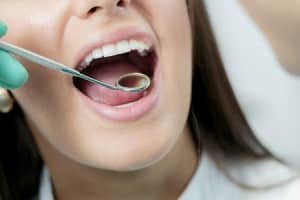If you would like to learn more about dental care, go to Dental Care and Pregnancy.
 Oral hygiene is essential throughout your pregnancy. Did you know that dental plaque is made up of bacteria that can be found in the blood, pass through the placenta and stimulate the release of prostaglandins, a hormone that provokes contractions? This is why daily mouth and teeth (and between the teeth) care is so important. It helps avoid dental plaque that can irritate your gums and prevent premature labour and a low birth-weight baby.
Oral hygiene is essential throughout your pregnancy. Did you know that dental plaque is made up of bacteria that can be found in the blood, pass through the placenta and stimulate the release of prostaglandins, a hormone that provokes contractions? This is why daily mouth and teeth (and between the teeth) care is so important. It helps avoid dental plaque that can irritate your gums and prevent premature labour and a low birth-weight baby.
Pregnancy gingivitis is a diagnosis made in more than 50% of future mothers between the 3rd and 9th month of gestation. The general population can be diagnosed with gingivitis. But pregnancy gingivitis is characterised by its particular and frequent occurrence during this period of life. Usually, everything goes back to normal after childbirth, but in severe cases, sores can cause permanent damage. Hormonal changes (estrogen and progesterone), more sensitive tissues, and increase blood volume mean that gums will be redder, brittler (bleed easily) and swollen. The presence of dental plaque (bacteria) causes gum inflammation, creating gingivitis. Eating sweeter foods and frequent snacking are aggravating factors.
Here is some practical advice from our dental pro, Simon, which can improve your situation:
- A balanced diet without a lot of sugar or carbohydrates, and take enough calcium, vitamins A, C and D, and proteins in circulation to solidify your baby’s teeth and bones;
- Brush your teeth after each meal with a soft toothbrush and use fluoride toothpaste; Use dental floss every day to remove plaque between the teeth and on the gums;
- Clean dental surfaces that aren’t visible;
- If you are vomiting, rinse your mouth with water or gargle with a mix of water and baking soda to neutralise the acid in your mouth. Some fluoride mouthwashes can also help.
- Plan a dental visit before 16 weeks of pregnancy for an oral evaluation, cleaning, and scaling to prevent future complications likely to occur during pregnancy. Then prepare a treatment plan for the 2nd trimester.
- Contrary to popular belief, you do not need to take fluoride supplements during pregnancy as there are no added benefits. It should even be avoided. Regularly use fluoride toothpaste you can buy in a pharmacy.
- Never use teeth whiteners during pregnancy and breastfeeding due to their contents, which should be avoided;
- Delay orthodontic procedures or teeth implants unless already started.
After childbirth:
- A dental appointment should take place within 6 months after childbirth, especially if your dentist delayed treatments. This is to avoid complications, even if your insurance only covers an annual visit.
- In dental terms, breastfeeding will never be affected by treatments. The only thing that may occur is that the taste of a mother’s milk may change if a local anesthetic was used. Build up a milk reserve before the treatment and give it to the baby during the 24 hours following the dental procedure.
To learn more, read the next part of this article : My Baby Was Born with a Tooth (in french only).


